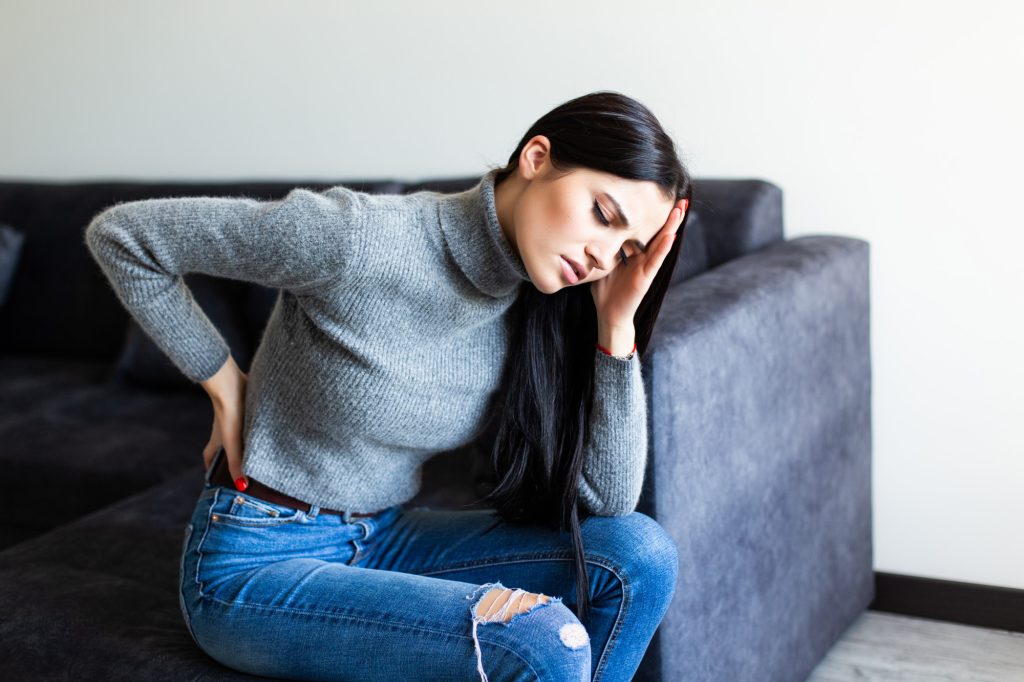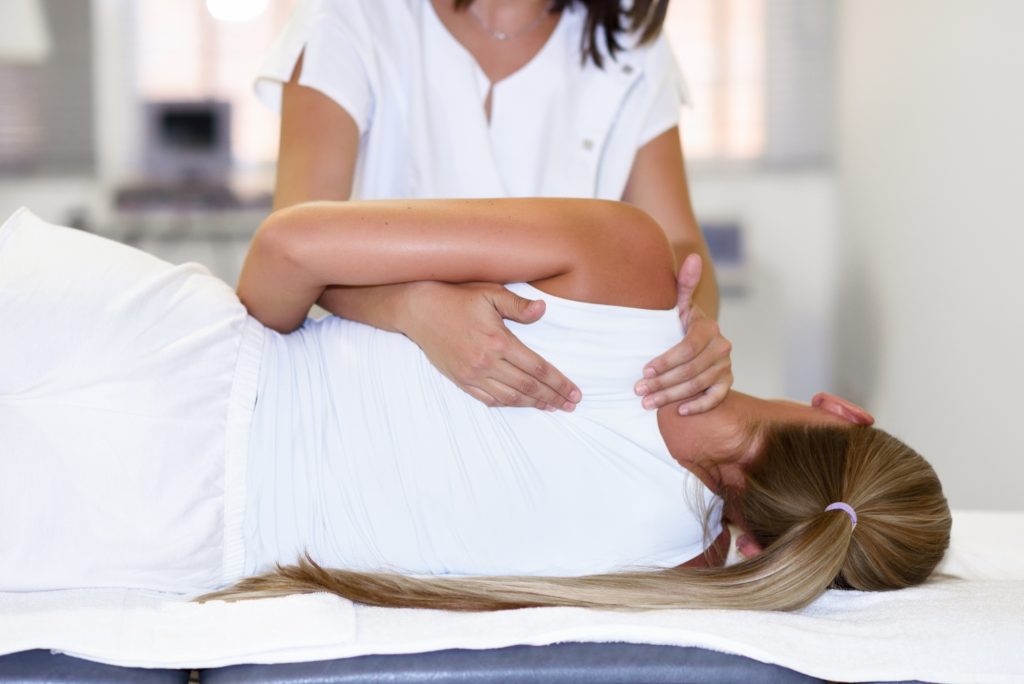Discover the factors contributing to the variation in postpartum back pain duration among women.
Understanding the Variation in Postpartum Back Pain Duration Among Women
Ah, the joys of motherhood! Bringing a new life into this world is undoubtedly a remarkable experience, but it’s not all rainbows and unicorns. Many women face the mighty foe known as postpartum back pain. Now, you might be wondering, what exactly is postpartum back pain? Let’s dive into this concept and explore the ins and outs of this not-so-friendly companion.

Exploring the Concept of Postpartum Back Pain
Defining Postpartum Back Pain
Imagine this: you’ve just given birth, and as you cradle your bundle of joy in your arms, you feel an unwelcome twinge in your lower back. Yes, folks, that’s postpartum back pain! It refers to the discomfort or agony that can plague women after labor. It can range from mild to downright torturous, and it can stick around for quite some time.
Postpartum back pain is a common issue that many women face after giving birth. It occurs due to a combination of factors, including hormonal changes, physical strain during labor, and the stress placed on the body as it adjusts to the demands of caring for a newborn.
Common Symptoms and Severity
Postpartum back pain can manifest itself in various ways. Some ladies may experience a dull ache in their lower back, while others may have intense spasms that make them feel like they’re auditioning for a contortionist show. The severity can differ from woman to woman, depending on various factors we’ll explore further.
In addition to lower back pain, women may also experience pain in their hips, pelvis, and upper back. This can make simple tasks like lifting the baby or bending over to change a diaper incredibly challenging and painful. The pain can range from a mild annoyance to a debilitating condition that affects daily activities and quality of life.
The duration of postpartum back pain can vary as well. For some women, it may only last a few weeks, while for others, it can persist for several months or even longer. The intensity and duration of the pain can depend on factors such as the type of delivery (vaginal or cesarean), the presence of any pre-existing back conditions, and the overall health and fitness level of the mother.
It’s important to note that postpartum back pain is not something to be ignored or dismissed as a normal part of the recovery process. While it is common, it should not be considered a “normal” part of being a new mother. Seeking proper medical attention and exploring treatment options can help alleviate the pain and discomfort, allowing women to fully enjoy the precious moments with their newborns.
Factors Influencing the Duration of Postpartum Back Pain
Now that we’ve dipped our toes into the river of postpartum back pain, it’s time to understand why some women find themselves battling it for what feels like an eternity while others bid it farewell quicker.
Role of Physical Health and Fitness
It’s no secret that fitness levels play a significant role in our overall well-being, and postpartum back pain is no exception. Women who maintain good physical health before and after giving birth tend to experience a shorter duration of back pain. Staying active, strengthening those muscles, and maintaining a healthy weight can make a world of difference!
Regular exercise not only helps to keep your body strong and flexible, but it also improves blood circulation, which aids in the healing process. Engaging in activities such as walking, swimming, or prenatal yoga can specifically target the muscles that support the back, reducing the strain and discomfort experienced during postpartum recovery.
Impact of Pregnancy and Delivery Complications
Complications during pregnancy and delivery can also influence the duration of postpartum back pain. Women who have experienced complicated pregnancies or difficult delivery processes may find themselves battling back pain for a longer period. It’s essential to have a supportive healthcare team guiding you through any challenges you may face.
During pregnancy, the body undergoes significant changes to accommodate the growing baby. Hormonal shifts, weight gain, and changes in posture can all contribute to back pain. In cases where complications arise, such as gestational diabetes or preeclampsia, the body may experience additional stress, further prolonging the recovery process.
Influence of Mental and Emotional Stress
Ah, the wonders of the mind! Mental and emotional stress can be sneaky little culprits that extend the duration of postpartum back pain. The more stress we carry, the more our bodies tense up, exacerbating the pain. So, dear moms, remember to take care of your mental well-being as much as your physical health!
Adjusting to life with a newborn can be overwhelming, and the demands of motherhood can take a toll on one’s mental and emotional well-being. Lack of sleep, hormonal fluctuations, and the pressures of caring for a newborn can contribute to increased stress levels. It’s crucial to prioritize self-care and seek support from loved ones or professionals to manage stress effectively.
Additionally, practicing relaxation techniques such as deep breathing exercises, meditation, or engaging in activities that bring joy and relaxation can help alleviate mental and emotional stress, consequently reducing the duration of postpartum back pain.
The Science Behind Postpartum Back Pain
Now that we have a firm grasp on the factors that can affect the duration of postpartum back pain, let’s delve into the scientific realm and uncover what’s happening inside our bodies.
Understanding the Anatomy of Back Pain
Back pain has a way of making its presence felt, but what causes it exactly? Well, the culprit is often the muscles, ligaments, and joints in your lower back that have undergone considerable strain during pregnancy and childbirth. Understanding the intricacies of this anatomy can help us find ways to manage and reduce the pain.
Let’s start with the muscles. The muscles in your lower back, such as the erector spinae and quadratus lumborum, play a crucial role in supporting your spine and maintaining proper posture. During pregnancy, these muscles can become weakened and stretched due to the growing uterus and the additional weight it places on your back. This strain can lead to muscle imbalances and contribute to postpartum back pain.
Next, let’s talk about ligaments. Ligaments are tough, fibrous tissues that connect bones to each other, providing stability and support to your joints. During pregnancy, the hormone relaxin is released, which helps to loosen the ligaments in your pelvis to prepare for childbirth. However, this hormone can also affect other ligaments in your body, including those in your lower back. The loosening of these ligaments can lead to instability in the joints and increase the risk of back pain.
Lastly, the joints in your lower back, known as the facet joints, can also be affected by pregnancy. These joints allow for movement and flexibility in your spine. However, the increased weight and hormonal changes during pregnancy can put additional stress on these joints, leading to inflammation and pain.
Hormonal Changes and Their Effects
Ah, hormones. Those delightful molecules that love to wreak havoc on our bodies. During pregnancy, hormonal changes occur that can affect the ligaments and joints, making them more vulnerable to strain and pain. It’s like cupid shooting arrows at our back muscles, but without the lovey-dovey vibes!
One of the key hormones involved in pregnancy is relaxin, as mentioned earlier. This hormone helps to relax the ligaments in your pelvis to allow for childbirth. However, relaxin doesn’t discriminate and can affect other ligaments in your body as well, including those in your lower back. The loosening of these ligaments can lead to instability in the joints and contribute to postpartum back pain.
In addition to relaxin, other hormones such as progesterone and estrogen also play a role in pregnancy-related back pain. Progesterone, known as the “pregnancy hormone,” helps to relax smooth muscles and prepare the body for pregnancy. However, it can also affect the muscles in your lower back, making them more prone to strain and discomfort. Estrogen, on the other hand, helps to maintain the integrity of your connective tissues, including ligaments. Fluctuations in estrogen levels during pregnancy can impact the strength and stability of these tissues, contributing to back pain.
So, while hormones are essential for a healthy pregnancy, they can also be a contributing factor to postpartum back pain. Understanding the hormonal changes that occur during pregnancy can help us better manage and alleviate this discomfort.
Management and Treatment Options for Postpartum Back Pain
We’ve covered the what and the why of postpartum back pain, but what about the how? Fear not, fellow warriors! There are various management and treatment options available to help you on your quest for pain-free motherhood.

Non-pharmacological Interventions
When it comes to managing postpartum back pain, non-pharmacological interventions can work wonders. Think heat therapy, cold packs, gentle exercises, and good old-fashioned rest. Taking care of your body and giving it the TLC it deserves can go a long way in alleviating that nagging pain.
Medication and Medical Treatments
Sometimes, despite our best efforts, that pesky pain just won’t budge. In such cases, medications and medical treatments can come to the rescue. Your healthcare provider may recommend pain-relieving medications or therapies such as acupuncture or chiropractic care. Remember, it’s essential to consult a medical professional to determine the best course of action for your specific situation.
Role of Physical Therapy and Exercise
Now, don’t go reaching for your gym shoes just yet! Physical therapy and exercise can be your allies in the battle against postpartum back pain. A skilled physical therapist can help you strengthen your muscles, improve your posture, and teach you some nifty exercises tailored to your needs. Remember, every journey begins with a single step, or stretch in this case!
Prevention Strategies for Postpartum Back Pain
While it’s true that conquering postpartum back pain head-on is an admirable feat, prevention is the name of the game. By implementing some simple strategies, you can reduce the chances of experiencing back pain in the first place.
Importance of Prenatal Care
Prenatal care is like a superhero’s cape, swooping in to save the day! Regular visits to your healthcare provider during pregnancy ensure your body is in tip-top shape, making it less prone to postpartum back pain. Plus, it’s a great opportunity to get those burning questions answered and build a support network!
Posture and Body Mechanics During Pregnancy
Who knew posture could be such a game-changer? Maintaining good posture and practicing proper body mechanics during pregnancy can significantly reduce the strain on your back. Avoiding slouching, lifting heavy objects correctly, and using supportive pillows can make all the difference.
Postnatal Care and Back Pain Prevention
After the arrival of your little bundle of joy, the postnatal care journey begins! Paying attention to your body’s needs during this time can help prevent postpartum back pain. Focus on gentle exercises, proper lifting techniques, and seeking the guidance of a healthcare professional to navigate this exciting chapter of your life.
And there you have it, dear readers! We’ve traipsed through the world of postpartum back pain, exploring its concept, causes, and prevention strategies. Remember, every woman’s journey is unique, so it’s vital to consult with qualified healthcare professionals to help you on your quest for a pain-free future. Now, go forth and conquer those parenting adventures with a spring in your step and a happy back!



